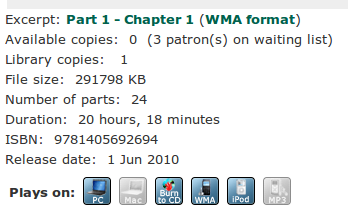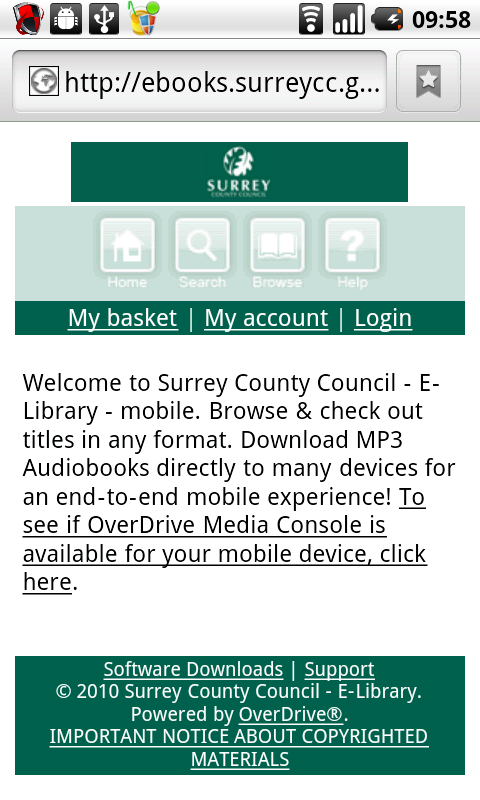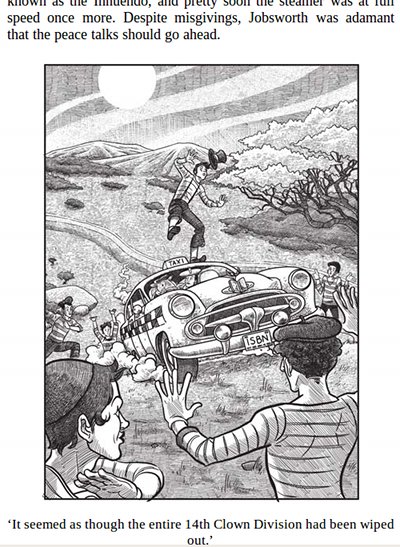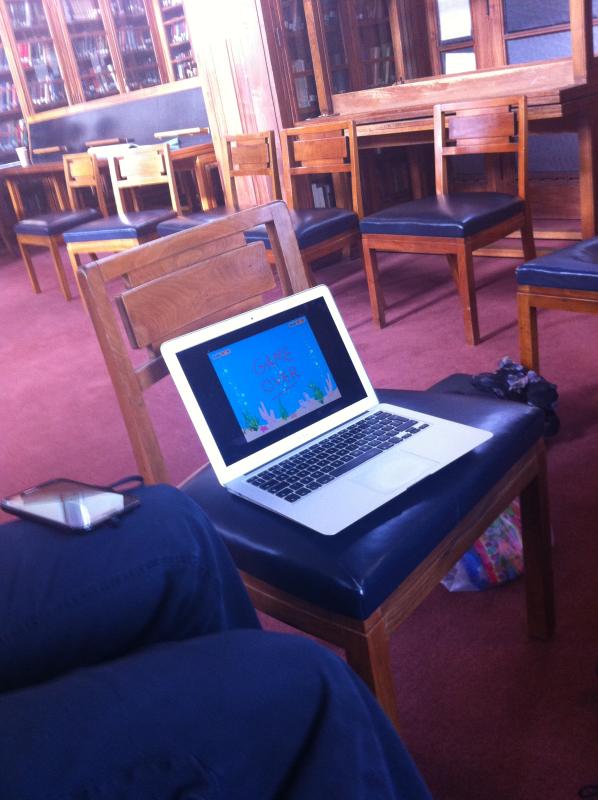eBook Libraries and DRM
I was pleasantly surprised to see this poster at my local train station. Looks like Surrey Library is moving to the digital age.
"Bet the site doesn't work on my phone," I thought.
I was wrong!
Overall, this is a brilliant new service. A great initiative to get people reading more books and improving library services. Take a look at http://ebooks.surreycc.gov.uk
There's just one problem...
DRM
Digital Restrictions Management - as the name implies - prevents you from performing certain actions with a file. As it happens, I don't disagree with the notion that a rented work should have restrictions on its use. These books are given to me for free - I don't own them. DRM serves to enforce the tacit social construct that - if I borrow a book from you - I'm expected not to lend it on and return it after a reasonable period. That's fine with me.
What I do disagree with is artificial scarcity. In the "real" world, if you only have 3 copies of a book, you can only lend out 3 copies. In the digital world, if you have one item, you can copy it an infinite number of times. Pick a file, hit CTRL+C then CTRL+V - instant copy. And you can do it as many times as you like.
 In a physical library, only one person can borrow a book at a time. In a digital library, it makes no sense to say there is only one copy.
In a physical library, only one person can borrow a book at a time. In a digital library, it makes no sense to say there is only one copy.
The title can be lent out to as many people who want it.
Some books are - bizarrely - more available than others. Why can some books have 7 copies and others only 1?

Which leads us in to the incredible situation of being on a waiting list for a digital file!
 This artificial scarcity also has an impact on the number of books you can borrow. If I'm going on a two week holiday, why shouldn't I be allowed to borrow as many books as I like? Taking those books from a physical library would stop other patrons enjoying the works - in a digital library anyone can borrow any work simultaneously.
This artificial scarcity also has an impact on the number of books you can borrow. If I'm going on a two week holiday, why shouldn't I be allowed to borrow as many books as I like? Taking those books from a physical library would stop other patrons enjoying the works - in a digital library anyone can borrow any work simultaneously.

Finally, we have the issue of copying. One of the reasons I use libraries is for research. In fairness, the DRM does allow for limited copying. But different books have different allowances despite - presumably - being covered by the same copyright regime.

This is madness. Why take something as amazing as the digital revolution and try to drag it down to the mundane level of the analogue world? It's like inventing the motorcar and insisting that drivers carry a bale of hay, replacement horseshoes and travel no faster that 50mph.
Compatibility
The side effect of this wasteful DRM is a lack compatibility with popular products.
The MP3 and WMA audiobooks require the OverDrive Media Console. ODMC is compatible with PC and Mac - but not Linux. It works on Android, BlackBerry, iPhone and Windows mobile - but not the billions of Symbian or J2ME handsets out there.
The DRM on the eBooks requires Adobe's proprietary Digital Editions software. It's not available on Linux and - judging by the comments on my blog - it doesn't work very well on Windows or Mac. It's also restricted to a few ebook readers - excluding Amazon's Kindle.
So, due to DRM, we're left with a library service which...
- Artificially restricts how many books are available.
- Forces people to buy a particular brand of eBook reader or mobile phone.
- Requires the use of Windows or Mac.
- Prevents the early return of some media (you can't "return" some books early. Why?)
- Stops the quoting of passages for future use.
Overall - what Surrey Libraries have done is take an amazing service and cripple it. The potential is there - they just need their mindset moved to the 21st century.






Hi
Good article and I agree with all you say, except you last sentence. This is not necessarily due to Surrey Libraries needing to move their mindset to the 21st century.
There are various ways publishers licence ebook content to librairies. They basically fall in to two categories: subscription and purchase. Subscription: You get access to a bunch of books, the moment you stop paying you loose access. Safari Books online is an example of this.
The other option, purchasing, is just that, you purchase one copy and are licensed to allow one person to access it at any one time.
Now my experience is more with Academic Libraries, where the content is a little different (content is often an unlocked pdf or html page(s) and viewed by chapter), but normally for us the publisher will handle controlling one (or more) concurrent users at any time. They don't send us a ebook, they simply provide access to the pages on their website which constitute their ebook.
But my point is this is probably more down to traditional limited finances than Local Council traditional thinking. They can only afford to buy a few copies of the ebook, and to handle the demand, limit the number any one user can borrow.
It's crazy, and not very logical. But think this probably represents a library trying its hardest to move in to the 21st century while abiding by publisher licences.
What this needs is a co-ordinated approach by libraries to lobby publishers. the MLA would have been ideally placed had they not just been disbanded.
I agree that artificial scarcity is idiotic, but don't you think they've been forced into this situation by publishers? If there were unlimited number of digital copies of every book in Surrey library, no-one in the world would buy another book!
Yes, it's not the library's fault, it's the only way publishers will deal with libraries and ebooks. Impose limits that disable technical capability. Sharing is bad - I think that's a rule that got left out of 1984.
Hello Terence
I work for Surrey Libraries. I don't know the ins-and-outs of the licensing spec. for the e-book/audio download service we provide via the Overdrive platfrom, but I've forwarded this blog post onto the e-book project lead, so they can respond to your concerns.
Re. "Overall, this is a brilliant new service. A great initiative to get people reading more books and improving library services." Thanks for that very positive comment. It's appreciated.
Gary
Hi Terence,
I work for a public library that also uses Overdrive, and the false scarcity issue is a PR nightmare for our patrons:
Staff : No, I'm sorry, you can't download that audiobook, it's "checked out" by another patron.
Patron : But ... it's ... digital?
Staff : right, but the publishers have us by the short n curlies here, and we can only legally allow one copy to be used at a time.
Patron : But ... it's ... digital?!?!?!
And so forth. To be blunt, this is why people who know how to do it turn to the torrents and illegal downloading. When you make the legal way irritatingly difficult, the black market steps up and fills in.
In my experience, all this is doing is teaching users that digital editions, instead of being revolutionary, are more trouble than they're worth.
And these services like OverDrive are NOT cheap.
I'm not even going to get into the various proprietary "download managers" that several of them make you install in order to even download a book.
There must be a better way. The way it is now is just horrible from a customer service / UX perspective.
Two (or 50) cents.
A.
I also work for a public library that offers Overdrive downloadable audiobooks for our patrons (actually the same one Andrea does).
Regarding the artificial scarcity, sadly, it all comes down to money. Overdrive charges libraries by the copy, so the more copies a library buys the quicker service their patrons get and the more money Overdrive makes.
There were so many complaints about this business model from librarians and their patrons that Overdrive now offers some - but not all - titles with unlimited copies... for a much heftier per title price tag.
So... I'm currently hold number 114 out of 114 on a title on the bestseller list for which my library consortium bought 15 copies. So I can expect to be able to read it around 4 months from now, if I can finish it in the 14 days allotted. Frustrating yes, but I'm not sure what the libraries can do about it, aside from forking over more and more money and complaining about the restrictions every chance they get. Yeah, our library could boycott the service, but frankly, we're small enough I don't think Overdrive would even notice.
Just wanted to reiterate that libraries aren't the "bad guys" here. Just strapped for cash and trying to do what they can for their patrons. Hopefully blog posts like this one won't go unnoticed by the companies offering this service.
And for those keeping score, NetLibrary is a competing company with a much higher proportion of always available audiobooks. But of course, I've found that getting the software and DRM to work together is just as much headache as with Overdrive.
Karen
Thanks for your comments, Terence.
The issues around DRM are complicated and controversial and are a major issue within the publishing industry. Surrey Libraries is offering this service within the current market model for ebooks. Developments within the industry may see the introduction of license agreements that offer simultaneous downloads and if that happens our service offer will reflect such changes.
The eBooks/eAudiobooks provider, OverDrive, has a License model of one copy, one user. This is part of their agreement with the publishers who allow them to offer the titles for use in the library market.
We have bought multiple copies of the more popular titles to shorten waiting times.
However, there is a limited budget and we have chosen to go for breadth of stock as opposed to fewer titles. We also need to allocate the budget across the financial year to keep the stock fresh as new titles become available.
Our starter collection has been very popular and we intend to extend this service. Over time the number of titles will increase and there should be more available for users to choose from.
Your comments have been noted and forwarded to OverDrive. We do hope you and many others will continue to enjoy the service.
Barbara Scott, Project Manager eBooks
Surrey County Council Libraries
I like the fact that someone blogged about this!
It's actually a great move by the UK libraries, the best thing done for a long time IMO. Kensington and Chelsea also have Digital Library based on the same OverDrive system. I totally agree with all your comments about artificial lending of X copies only and issues around DRM, etc. But, I am forgetting all these issues simply because this is sooo much easier than going down to the library and borrowing the paper books.
I have some other complaints but I guess mainly related to OverDrive system:
1/ It's hard to renew books, you basically need to check them out again if you haven't managed to read them in 2 weeks rental period.
2/ You really need decent tech knowledge to transfer borrowed books to eBook readers - it's not very straightforward, it involves Adobe Digital editions which is a pain to use. I have iriver Story which is a great ereader, I just think we have a long way to go regarding usability issues regarding the content transfer.
3/ Overdrive sw does not work on Symbian phones, that's annoying. They should have at least j2me app if Symbian app is too "difficult" to develop.
4/ I would also love to use it on Maemo phone like N900 but I guess that would be wishful thinking 🙂
5/ I am pushing "boundaries" here but why restrict this to books and audio only, I would love to "rent" movies from the library too. Ken and Chelsea library has decent selection of DVDs, would be great to see them transferable for watching on portable devices. I am sure tons of DRM issues here but it would be good to have...
I am sure there are other things I am annoyed about, I just can't think about them atm.
Btw, Terence, thanks for coming to Accenture to give us your talk on the future of Android (and what's "wrong" with it). Good talk, I enjoyed it...
Dragan F
It's 2021 and this is still an issue. (I live in the US and I am on Windows.) It's annoying that whenever I want to borrow and read an eBook on my Kindle, I need to check it out (or wait until it's my turn to check it out), select Download as EPUB and click Confirm, click Download as EPUB (after the page refreshes), save the file, open the file using Adobe Digital Editions, then open Calibre (it's a tool for managing your eBook library and reading eBooks on the computer), click Add Book, find the .epub file in Adobe DE's save folder, import it, then connect my Kindle and upload the book. I use a plugin called De-DRM for Calibre that gets rid of the DRM on the .epub file so I can read the eBook on my Kindle. Side effect of the De-DRM plugin is that the eBook will never expire on my Kindle, and I can immediately return the eBook on my library's interface so other's can read it too.
I am "on hold" for an ebook at the city library and I 100% agree 👇